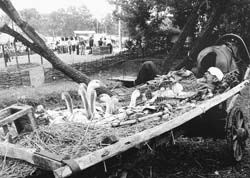No long-range outlook
Why state support for rural areas is ineffective
Ukraine has a vast agrarian potential, but only 20-25 percent is being utilized. We all know the reasons for these shortcomings: the agricultural sector lacks financial resources, and its underdeveloped material-technical base does not allow the introduction of modern managerial techniques. Last year, gross agricultural product amounted to 69 billion hryvnias. The figure could have been considerably higher; if the average amount of resources that are assigned to agricultural in the developed countries was “transposed” to Ukraine’s agriculture, our agrarian output should have stood at 300 billion hryvnias, said Leonid Kozachenko, president of the Ukrainian Agrarian Federation, addressing an international conference on “Topical Aspects of Agrarian Policy” in Kyiv.
Experts believe that the main reason for the difficult situation in the domestic agrarian sector is the government’s ineffective policy, which has failed to outline the best way to develop the agroindustrial complex (AIC). Six AIC development programs have been worked out over the past six years (a seventh is being prepared) but none has clearly formulated the task of developing precise rules of the game or creating a favorable environment. These programs were aimed at combating the aftereffects of programs rather than eliminating their causes.
Agrarian market operators are critical of the role played by the state in supporting the countryside. Price-setting support appears to be especially irrational. Even increased financial aid over the past several years has failed to secure the expected growth of agribusinesses’ profitability. In 2004, budget appropriations for price support of domestic grain suppliers amounted to more than 800 million hryvnias. However, out of tens of thousands of agricultural producers only a couple of dozen businesses actually received this price support, while the profitability of Ukraine’s grain output dropped from 46 percent in 2003 to 23 percent in 2004. Central budget appropriations aimed at supporting agricultural manufacturers are not being used as systematic support for the industry but as direct support. In the long-term perspective, this fails to produce the desired effect. Increasing direct support of the countryside does not lead to salary increases and better social conditions. The result, noted Mr. Kozachenko, is that Ukraine probably has the lowest rural social indices on the territory of the former USSR, superior only to Georgia and Armenia.
State support of the AIC has long ceased to be a domestic Ukrainian issue; it is one of the most complicated points on the agenda of Ukraine’s WTO membership. Andriy Berezny, Ukraine’s deputy minister of economy, is convinced that all the “t’s” will be crossed during lengthy discussions on this subject; the WTO’s task force that is responsible for Ukraine’s membership will hold another meeting in Geneva in late September. Mr. Berezny says that Ukraine faces stiff membership prerequisites and they must be met. Ukraine has already complied with one prerequisite by canceling further export subsidies and thus refraining from stimulating domestic supplies to foreign markets. In addition, 80 percent of import tax procedures have been brought into conformity with WTO regulations. In the agrarian sector, the WTO is demanding restrictions on direct subsidies (known here as the “yellow box”), lowering them to 1.14 billion dollars a year (i.e., over 5 billion hryvnias). The ministry of economy has agreed to this requirement, since direct subsidies make it impossible to sustain a normal level of competition on the agrarian market; nor do they correspond to the principles of a market economy. Moreover, Mr. Berezny believes that in the nearest future Ukraine will not be able-even theoretically-to allocate over 1.14 billion dollars to support the AIC, as it will be able to reach this index only in five to seven years. In his opinion, therefore, the issue of state support for the agrarian sector is a matter of dispute rather than principle between the economy and agrarian policy ministries.
In the absence of effective state support, the AIC can only count on investments made directly to agricultural production. Potential investors are prepared to produce hard cash, but they are leery of the possibility that risks will exceed revenues. Above all, these investors are scared by the political and economic risks involved, and the possibility of changes in the government’s policy concerning the agrarian sector. Neither are there stable rules of the business game. “Changes in business politics that occur in one week take decades in the developed countries. In this kind of environment no investor can feel confident,” notes Mr. Kozachenko.
Civic organizations and professional associations in the agroindustrial sector say that the post of deputy prime minister responsible for the AIC must be restored. Liudmyla Zinchenko, director general of the association Ukroliyaprom, says that reinstating this post and relaunching the work of specialized committees to deal with this sphere will help in the search for more effective solutions to the problems besetting this industry. Mykola Kompanets, president of the Ukrainian Grain Association, also supports the idea: “It is wrong not to have a deputy prime minister responsible for the agroindustrial complex in an agrarian country. There are many trends in this industry that must be coordinated.” Leonid Kozachenko, regarded by many as the next AIC deputy prime minister, summed up: “We don’t know how long the new government will remain in office; if it’s seven or eight months, then it would be best to act according to the sector principle, so that the government can step up its efforts in industries marked by instability and output decline.”






